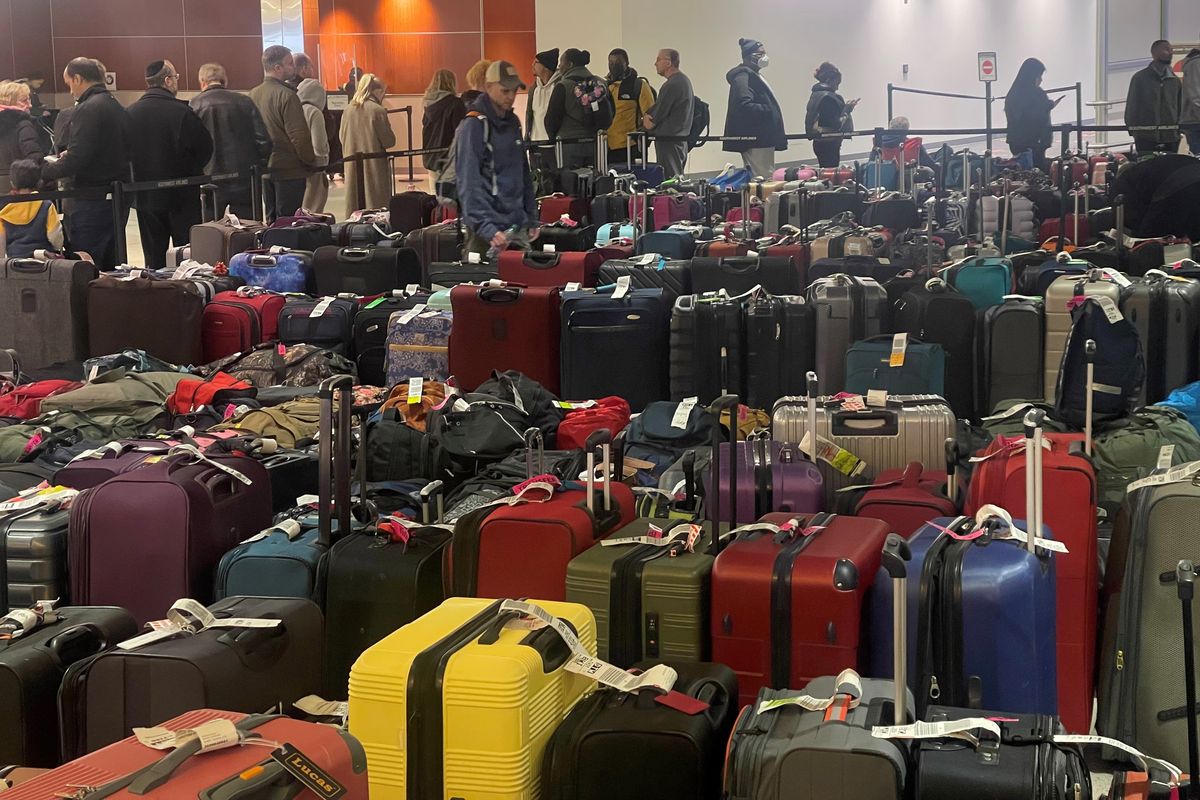Southwest draws regulatory scrutiny as thousands more flights canceled

Southwest Airlines accounted for 86% of canceled domestic flights Tuesday, drawing the attention of U.S. regulators amid a dayslong meltdown of holiday air travel that began with a winter storm late last week.
More than 2,900 U.S. flights were canceled Tuesday among all carriers, with Southwest accounting for more than 2,500 of the total – a problem union workers blamed largely on antiquated technology for tracking and creating employee schedules.
The airline wasn’t flying 63% of its scheduled flights Tuesday, even as other carriers appeared to recover.
At Spokane International Airport, six of the eight arriving Southwest flights, and the same number of departing flights, were canceled Tuesday.
Among other major domestic carriers, about 2% of flights were not operating as planned, according to flight-tracking website FlightAware.
The carrier’s disruptions attracted scrutiny from the Transportation Department, which said it was looking into Southwest’s handling of cancellations.
The chaos upended holiday travel plans for tens of thousands of air travelers at a time when industry executives and analysts expressed optimism over their ability to handle an onslaught of holiday passengers.
While all carriers have reported some delays and cancellations in recent days, Southwest’s inability to get travelers to their destinations continued to stand out at airports across the country.
The carrier already has canceled about 2,500 flights scheduled for Wednesday, amounting to nearly 99% of domestic flights being scrapped that day.
The Department of Transportation said it will examine Southwest’s mass cancellations, which stranded passengers days after a winter storm gripped much of the country.
The agency will look into “whether cancellations were controllable,” it said in a tweet Monday night.
President Joe Biden tweeted that his administration was “working to ensure airlines are held accountable,” urging passengers to check the Department of Transportation’s website to see if they are entitled to compensation. Transportation Secretary Pete Buttigieg said in a tweet that he is monitoring the situation.
“I’m tracking closely & will have more to say about this tomorrow,” Buttigieg tweeted Tuesday .
More than 5,500 domestic flights were canceled Monday, while more than 17,300 flights were delayed – disproportionately among those belonging to Southwest.
The air carrier apologized for the disruptions, calling them “unacceptable.”
The airline said it would continue to operate at a significantly reduced schedule, flying about one-third of its normal schedule for “several days.”
The storm hit Southwest hard in Denver and Chicago, where it has large operations, according to company spokesman Chris Perry.
The airline doesn’t have central hubs like many other carriers, and is instead spread out across much of the country.
Southwest’s tools to match flight crews with planes were also “struggling,” adding to the disruptions, Perry said, denying that understaffing played a part in the upheaval.
Lyn Montgomery, president of TWU Local 556, which represents about 18,000 Southwest flight attendants, blamed the carrier’s problems on outdated scheduling technology.
After the initial wave of storm-related cancellations, flight crews often had to be notified manually about flight changes, an arduous process that sometimes involved flight attendants waiting on hold for hours to speak to workers who handle scheduling, she said.
Montgomery shared screenshots on social media showing examples of flight attendants who waited more than five hours on the phone.
Many flight attendants weren’t able to get on flights to be in the correct cities for their shifts, she said.
Crew members, who are mandated to take rest periods, also ran into time limits.
“All of these issues are compounding on one another,” Montgomery said.
Montgomery, who has been a flight attendant for 30 years, urged passengers not to give up on the airline and its crew, saying the union will hold management accountable.
“We’re still in the thick of it,” she said Tuesday. “We’re not out of the weeds yet, but the company has made mass cancellations in order for us to reset and stop that domino effect.”
In an earlier email, Southwest said “Winter Storm Elliott created a very large volume of flight cancellations which disrupted our network and Crew schedules – which must be created and, then, tracked closely to comply duty time regulations.”
The reason for the delays created little comfort for passengers whose plans were overturned.
Yata Watts, 50, a tax preparer and real estate agent who lives near Houston, was leaving about 3:30 a.m. Friday to catch an early-morning flight to Fort Lauderdale, Florida, with her three children when she got a notification they were rebooked on a 3:45 p.m. departure.
That flight also was canceled.
With their Royal Caribbean cruise set to sail at 4 p.m. that day, the timing wouldn’t work.
She scrambled and found a United flight for the family, shelling out another $1,000 for tickets.
They made it onto the cruise and planned to head home Tuesday, but Monday night she was notified that her flight home – with a connection in New Orleans – was also canceled.
“They’re not giving any options to rebook at all,” she said. She had to pay another $1,000 to fly United back home, on Thursday.
She and her children, ages 11, 13 and 17, are passing time in a South Florida hotel. She plans to submit a refund request to Southwest for her canceled flights and the extra expenses incurred.
Across the country, Southwest passengers who called customer service lines early this week to speak to a company representative were on hold for hours.
The airline’s website and app – warning of extended wait times – also urged customers to speak with gate agents at airports, where they waited hours more.